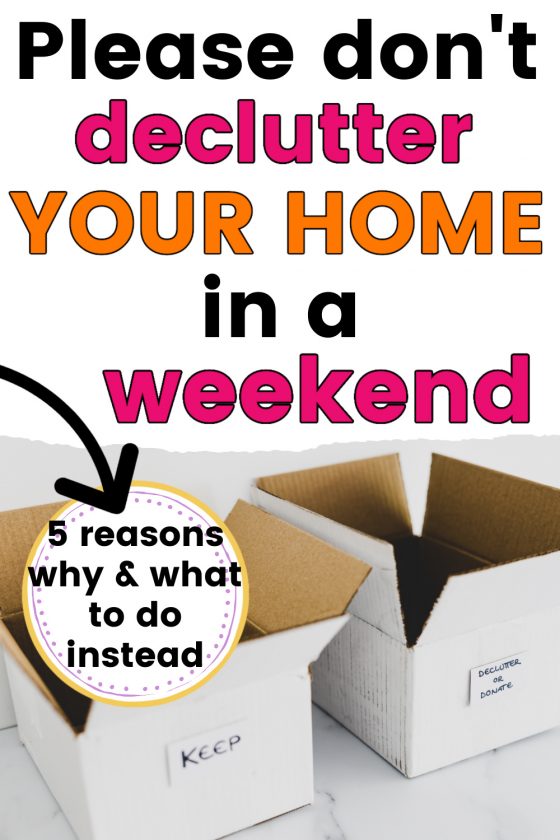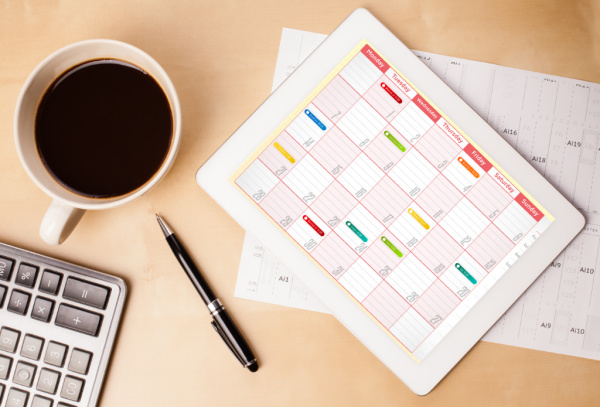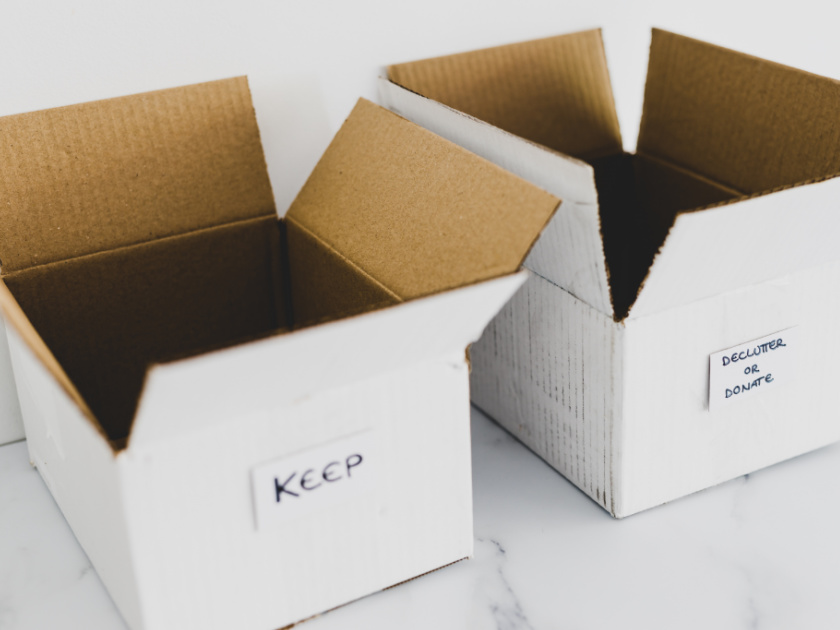Inside: Have you seen articles teaching how to declutter your home in a weekend? Here are five reasons this is really not a good idea. I offer a simple, alternative decluttering process to follow over a few weeks (or months), instead.
Every so often I come across a blog post about how to declutter your whole house in a weekend. It sounds so appealing.
I’m an achiever. I live for challenges like this one.
Plus, who wouldn’t jump at the chance to have a decluttered, organized home in just one weekend?!
It’s the stuff dreams are made of.
I also can’t really blame the bloggers writing these articles. There is clearly a demand for them AND when you live in a clutter-free home, you want that for your readers, too. As quickly as possible.
While it might be an achievable dream for a few, it’s definitely only a dream for most people who are just starting the decluttering process.
I mean, I just watched an episode of The Home Edit on Netflix, where Joanna and Clea decluttered and organized a single kitchen.
One room.
I’m not sure how long it actually took them to accomplish the task, but it was definitely several hours. And that’s with three people!
Part of it might be the difficulty of making decisions about someone else’s stuff, in someone else’s home, but if it takes the professionals several hours, it’s definitely going to take you a similar amount of time.
(Also, their time included how to put it all back in an organized fashion…but we’ll get to that.)
Depending on how much clutter you have to start with, you might be able to get the job done. But even if you could, it’s really not a good idea to declutter your home in a weekend.
Here are five good reasons to avoid this temptation…and what to do, instead.

5 Reasons NOT to Declutter Your Home in a Weekend
These five points are based on my personal experience with living a minimalist lifestyle (with five kids and a not so minimalist husband) and decluttering multiple times over the past five years.
1. You will be more likely to experience decluttering regret.
When you try to declutter your home in a weekend, you are going to make a LOT of decisions.
Decision fatigue will set it – no question.
When it does, you will probably make one of the following decluttering mistakes, depending on your personality type and how cluttered your home is to begin with:
- Get rid of too much stuff.
- Burn out, and stop decluttering altogether.
- Keep too much stuff and call it a day.
We’ll just focus on the first one for now.
Is it really possible to get rid of too much stuff? Yes.
I’ve come across several blog posts about people getting rid of too much stuff in their decluttering zeal.
Like the paperwork this person got rid of which would have been incredibly helpful in later writing a book, or the everyday comfort items that this person decluttered just before her partner faced a huge medical crisis.
I’ve personally gotten rid of things myself that I regretted and ended up digging through the garbage to find. Granted, this was an outlier experience that happened right after my dad died, but still.
Decluttering regret typically happens when:
- you start decluttering with some lofty minimalist goal in your head (I will own X number of items) OR
- you’re just so freaking tired of picking up crap, you’re practically willing to burn it all to the ground. #beenthere
(Both people in these scenarios are also more likely to be drawn in by the “declutter your home in a weekend” headline.)
Sometimes you accidentally get rid of easily replaceable stuff, like a toaster.
Other times, it’s photos you didn’t think you’d want…until you experience unexpected death. Then you are more than a little angry at decluttering.
Those people end up frustrated and more than a little bit bitter toward decluttering and minimalism in general.
Unless your goal is to live an extreme minimalist lifestyle, you probably don’t want your home to contain only what you absolutely need. You probably want your home to contain things that make you smile, that bring you comfort and joy (I’m writing this at Christmastime – can you tell?).
2. You might burn out and stop decluttering altogether.
You don’t want this to happen, but it definitely can if you’re trying to declutter too much, too soon.
Especially if you have a LOT of stuff to declutter, and when you’ve already made fifty decisions and you’re surrounded by so.much.stuff. that you can’t even walk through it, giving up sounds like a reasonable choice.
Shove it all back. Walk away.
Or worse, it all stays out, and you’re worse off than before. That’s a recipe for never trying to declutter again: ever.
Don’t let this be you!
3. Rapid decluttering can have a nasty rebound effect.
When you declutter your home in a weekend, it’s a little bit like extreme dieting.
You commit to get rid of so much stuff, some stuff you don’t need, some stuff you might love but you don’t actually need.
And for a while, you feel good. Your house is clutter-free and peaceful.
It’s awesome.
But you never address the root issues of why your home got so filled with clutter in the first place.
So those weekly trips to Target when you throw in just a couple things on clearance?
Just one cute, seasonal throw pillow. One more toy your child begged for in the toy aisle. One more bath mat – it’s so fluffy!
Those purchases seem harmless.
Until several months later when you realize your home is right back to where it was before you bent over backwards for an entire weekend to declutter.
In fact, you might end up with more clutter than you started with. It happens.
When you declutter over several weeks, it gives you a chance to change your buying habits, feel the effects of how much work it is to actually get rid of clutter.
Those things are crucial if you are going to keep your home clutter-free for the long haul.
Related: 10 Steps to Break Your Shopping Habit for GOOD
4. You are more likely to get rid of your clutter the easy way, which doesn’t help break those bad habits (not great for the earth, either).
When you’re getting rid of a TON of clutter all at once, it can be extremely overwhelming. And when you’re overwhelmed, you’re going to do the easiest thing possible: drop it all off at a thrift store.
Now there’s nothing wrong with donating things to the thrift store. I’ve definitely dropped off my fair share.
But especially in America, we have this idea that someone else can benefit from our cast-offs, and it makes us feel better about our excessive consumerism.
Would it help if you knew that a large part of thrift store donations can’t actually be sold?
They end up being shipped to another country in hopes that someone, somewhere, on this planet can use our old stuff.
OR it’s just plain old thrown away. See this quote I came across with a little searching (source):
I stopped donating to [Good Will] when a friend of mine worked there a month and told me that they throw away about 80% of their donations. If the item looks used, or is not being sold at the mall right now, they throw it away. Not donate to the shelters, or send them to third world countries, they toss bags of items into their locking dumpster.
Ebay Community Member
When you declutter at a slower pace (not at a breakneck speed weekend pace), you have time and energy to deal with the things you don’t want anymore.
You can post them on Facebook marketplace, offer them free to friends, host a yardsale, sell them on eBay.
Responsible decluttering should, in my opinion, involve rehoming your cast-offs.
It’s remarkable how much more carefully you consider your purchases when you realize how much work it is to get rid of things when you’re done with them.
Related: The Right Way to Deal with Decluttering Guilt
5. When you declutter your home in a weekend, you leave little time for organization.
Decluttering isn’t organization.
When you declutter too quickly, you usually end up taking everything out and putting everything back with no thought to where is the best place for your things.
Here are a few problems that come up when you neglect to organize what’s left after decluttering:
That can lead to misplaced items, which you then go out and rebuy, even though they’re in your house somewhere.
It can also lead to multiple items having no clear “home”. So even if you declutter a TON of stuff, your home might still look and feel cluttered because nothing ever gets assigned a clear “home”.
That means you’re likely to use something and leave it out on a counter.
You’ll avoid putting it away because you’re not sure where to put it.
Slow decluttering leaves time for proper home assignments (a.k.a. organization).

What to Do Instead of Decluttering Your Home in a Weekend
Here’s a loose decluttering plan. Modify it to suit your unique personality, needs and goals.
Check out these 12 best decluttering books for more help!
1. Know yourself.
The other day I was rewatching an oldie but goodie: The Runaway Bride.
If you haven’t seen it, a reporter runs a story on a woman who ditches grooms at the altar – three times and counting.
It turns out that Maggie Carpenter doesn’t know herself very well at all. She tries to become whoever she thinks is the next boyfriend’s ideal woman, with no opinions, tastes, interests of her own (she even changes how she likes her eggs).
As I watched I realized that so many decluttering articles neglect this crucial pre-decluttering step: know yourself.
You need to know your likes and dislikes…
Whether or not you’re sentimental to a fault and love thumbing through photo albums with physical pictures (you’ll obviously ignore the advice to digitalize all your photos), or if you like your living room cozy with more than the average number of throw blankets (you’ll have more blankets than the typical minimalist, and that’s o.k.).
And you need to know why you’re even decluttering in the first place.
Are you decluttering just because some authority figure told you “should”? Because you truly ARE overwhelmed by your home? You want more time?
If you don’t know the answers to these questions, you’ll just follow whatever formula the next decluttering expert throws out there.
I’m willing to be that will involve getting rid of stuff you’ll later regret.
Slow decluttering gives you time to get to know what you like and dislike along the way if you don’t already (see the power of the “maybe” box in step #5).
2. Decide where to start (2 different options).
I prefer to start with what I consider to be the easiest room – the room least likely to have sentimental stuff and difficult decluttering decisions.
If you want an easy win, start decluttering in the bathroom first.
It’s small. It’s easy. Pretty painless.
Starting in the bathroom can give you the momentum you need to keep going.
But if you want something bigger to sink your teeth into, choose a room you want to love being in, but it’s too cluttered to enjoy.
The living room. The kitchen. Your bedroom.
Where do you most want to enjoy being, but it’s the least peaceful room in the house because of clutter?
Start there.
Related: The Best Place to Start Decluttering When You Don’t Know Where to Start
3. Plan on decluttering 1-2 rooms a week, and tell someone about it.
Those who fail to plan, plan to fail. Or so someone famous once said.
The pull of the declutter in a weekend idea is to get it all done in one fell swoop, so you don’t need to stretch it out over weeks.
What you really need is a simple plan of attack. So grab a calendar and write down which room(s) you will focus on each week, until there are no more rooms left.
If you want someone to tell you exactly what to do, Joshua Becker’s The Minimalist Home will walk you through it room by room.
Sometimes you just need to take the decision-making out of it and let someone else tell you, “Declutter your home in this order.”
Then tell someone your plan. There’s nothing like accountability to keep you on track.
4. Start with the obvious trash.
Grab a trash bag and get rid of any obvious trash first.
Broken things. Expired things. Things you will never use again but have no value to anyone else (those sneakers you ran a marathon in – don’t donate those to the thrift store, no one wants your smelly sneakers).
This should be super easy to do…
Unless you are super thrifty and frugal, thinking of all the possible uses for those few extra popsicle sticks, and/or feel super guilty throwing away things you might fix one hypothetical day in a hypothetical future where you actually are handy and like to fix things.
If that’s you, read this post with seven reasons it’s so hard to throw things away – and how to overcome them.
Once you get rid of the trash, your space should start looking a lot better! That will give you the push you need to deal with the hard stuff.
5. Label one box “maybe get rid of”, and use it liberally.
I’m pretty generous with my “maybe” box. If there is even a hint of doubt in your mind about getting rid of something, but you think you probably “should”, toss it in the “maybe” box.
That’s the box you’re going to store in your basement for 5-6 months to see if you miss anything in it.
Being super generous with your “maybe’s” allows you to make faster decisions because you aren’t worried that you’ll accidentally declutter something you’ll need or want later.
Here’s to Slow Decluttering
I’ve done it both ways. I did the massive purge when I first picked up Marie Kondo’s little blue book.
I ended up with not enough clothes, AND my kids still won’t let me forget some of the toys I got rid of that they wish we still had.
Decluttering round two (and three and four) were slower, more thoughtful.
I took my time. There were lots of things in the “maybe” boxes.
I changed my shopping habits in order to avoid recluttering my home.
I’d choose the second method over the first any day.
I like to compare decluttering to losing the pregnancy weight. It takes nine months to gain that weight, and for most women it takes at least nine months to lose it.
(Anyone who is telling you how to lose the pregnancy weight in six weeks is selling something. #truth)
The same is true with decluttering: it took months to pack your home with clutter, and you need AT LEAST a month to get rid of it if not more.
Maybe you need to take advantage of that initial crazy burst of decluttering zeal/energy.
That’s cool. I remember what that feels like.
But try to use that initial energy on that first round of obvious trash. OR do an initial sweep through your house for things you’ve been meaning to get rid of but haven’t.
I know you want that decluttered home, and you want it now.
But if you take your time, you’ll end up with a clutter-free home and the habits to keep it that way.
The slow and steady decluttering method will pay off eventually: I promise.
Read Next: 12 Best Decluttering Books for a Clutter-Free Home

